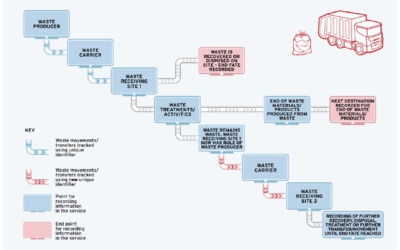Waste is perceived as a relatively recent problem. For thousands of years, the small amount of waste created was essentially fed back to the land. It was the industrial revolution in the UK, and similar catalysts for urbanisation in other countries, that led to increased populations, increased demand for goods and the increased waste.
Since World War Two, consumerism has become the backbone of societies around the world. We buy new more often, throw away more often and rely on man-made materials such as plastics to make our lives more convenient. So, we have adopted new behaviours and ways of living that have had a substantial – and planet-changing – impacts on the way we live.
The need for waste management
The amount of waste we create has resulted in the need for someone to deal with it. Historically, waste of all types has been collected and disposed of into landfill. Every piece of rubbish that’s wasted or burned releases carbon emissions that damage the atmosphere and contributes to the climate emergency – our climate emergency.
So, waste management companies have traditionally been in the business of collecting and disposing of waste. It’s been a fragmented and largely unregulated area, something that has led to a number of environmental and public health issues.
Today, however, we see these waste management companies changing. And change they must. To begin with, we generally refer to them now as waste management and recycling companies. Those that fail to see the opportunities in a circular economy, or cannot meet increasingly stringent regulations, will simply go out of business.
If the world were to adopt ‘good practice’ waste management and recycling solutions, the climate emergency would go from one that generates greenhouse gas emissions to one that generates a net saving of 0.8-1.1B tonnes of CO2 per year.
Waste is a business opportunity
There is value in waste, and realising that value provides additional income streams for waste management companies, and for every organisation in the value chain. Commodities such as wood, plastics, paper, metals, and electronics represent billions of pounds’ worth of income and there is a genuine and growing market for reusing or upcycling materials in this way.
This means that waste companies are fundamental to moving the waste and recycling industry – and the planet – from a linear model, where waste is collected and dumped, to a circular model – collect and separate, recycling, reprocessing and reuse, ready for sale into secondary markets.
This circular model is a supply loop that reduces waste and the need for landfill, and puts the value of materials back into the economy. This in turn creates additional revenue opportunities for the businesses involved.
Of course, moving to a circular economy model requires investment in recycling and processing facilities, additional vehicles, field equipment and Internet of Things and more labour, but profit is there to be made, and companies who understand the importance of investing in better technologies to run their business, for example, are more likely to win big contracts, have the ability to acquire smaller waste businesses, become industry leaders, and have long term sustainability.
Finally, making the most of this business opportunity requires a focus on customer service as customers – from public authorities to private companies – are the centre of everything. They need to know that they can rely on their waste management provider to be supportive, effective, customer-driven and responsive, in addition to being environmentally compliant, which drives a zero waste approach. Waste management companies that do this will have a stronger position for tenders, making them more competitive and more successful in the long term.
The compliance conundrum
Compliance is at the beginning and end of everything, so part of the ‘growing up’ of the waste and recycling industry is driven by legislation, regulation and compliance. There is recognition socially, economically and politically that we need to do more if we are to slow down the effects of climate change. That work needs to be done now, and so organisations of all types and sizes will have to meet environmental standards – and prove that they are meeting them.
This has a dual impact on waste management companies:
They need to manage their own regulatory requirements – although they may vary from country to country, waste management and waste management companies will need to prove that they are reusing or recycling a significant percentage of the waste they collect. They will have to report across a number of measures and be able to demonstrate their commitment to reducing, reusing and recycling, striving to create circularity. Failing to do so is likely to result in significant fines and potentially even legal action from the relevant environment agency. Perhaps a worse outcome is consumers who will boycott companies and their products if they can’t prove their sustainable credentials, and this will have a knock-on effect.
They need to support their customers’ compliance – for example, the UK government has introduced mandatory climate-related financial disclosures and a range of waste reduction and recycling legislation for publicly quoted companies, large private companies and LLPs. This requires evidencing not just the company’s own approach, but that of its supply chain – known as Scope 1, 2 and 3 emissions reporting. This will mean waste management companies will have to track and document materials recycling in order to report back to their supply chain.
In light of this type of regulation and the social and economic pressure to commit to net zero targets, many companies have also committed to ‘net waste’ or ‘zero waste’ targets by 2030. This gives them just 8 years to fully rationalise their consumption and waste, and they will need to work with serious waste management partners who have the systems in place to support these targets.
Taking waste management seriously
The result of these economic, social, political and legal pressures on the industry is that companies now have to decide whether they are ready to invest in the facilities, people and systems they need in order to be a serious player in the industry.
This includes investing in the technology that drives better operational visibility and faster, more accurate business reporting. For example, choosing technology that allows companies to plan, track, manage, capture, and effectively control the entire waste management and recycling operations using advanced, integrated software. Better technology also helps manage the move to a circular model and puts businesses in a leading position with their green credentials for their customers and the wider community.
To find out more about our Waste & Recycling One software and how it can transform your business, contact us today.






